Minister Without Portfolio John Deng (鄧振中) on Monday held a virtual meeting with US Trade Representative (USTR) Katherine Tai (戴琪) to discuss bilateral trade issues.
During the videoconference, Deng, who serves as the Taiwan’s top trade negotiator, expressed the hope that Taiwan and the US would begin talks on a bilateral trade agreement, an official in the Cabinet’s Office of Trade Negotiations told the Central News Agency yesterday on condition of anonymity.
The official declined to comment on whether the bilateral discussions touched on the Indo-Pacific Economic Framework (IPEF), an initiative proposed last year by the US government with the aim of enhancing its economic engagement in the Indo-Pacific region.

Photo: Taipei Times / AFP
Nor was it mentioned in a readout provided by the USTR.
In Monday’s meeting, the two sides reviewed progress made on bilateral trade issues since a Trade and Investment Framework Agreement (TIFA) council meeting in June last year, and agreed to remain in contact on those and other issues in the coming months, the readout said.
“They also discussed their mutual interest in working together on issues of common concern, including regionally and in multilateral organizations like the World Trade Organization,” the readout added.
The IPEF has yet to be clearly defined, but according to a US Congressional Research Service report, US officials do not envision it taking the form of a traditional trade agreement.
Instead, it is to include different modules covering “fair and resilient trade, supply chain resilience, infrastructure and decarbonization, and tax and anticorruption,” the report said.
Taipei has expressed an interest in participating in the IPEF initiative.
However, at a US Senate hearing at the end of last month, Tai was unwilling to comment on whether Taiwan would be invited to join the planned IPEF, saying only that the matter had yet to be decided.
Deng and Tai held their first bilateral meeting in June last year, shortly before the TIFA council meeting, which included high-level trade and investment talks between the two countries.
During the TIFA council meeting, the two sides discussed bilateral trade issues such as supply chains, intellectual property and agriculture, while exploring opportunities to work together on tackling the climate change crisis, the USTR added.

NATIONAL SECURITY THREAT: An official said that Guan Guan’s comments had gone beyond the threshold of free speech, as she advocated for the destruction of the ROC China-born media influencer Guan Guan’s (關關) residency permit has been revoked for repeatedly posting pro-China content that threatens national security, the National Immigration Agency said yesterday. Guan Guan has said many controversial things in her videos posted to Douyin (抖音), including “the red flag will soon be painted all over Taiwan” and “Taiwan is an inseparable part of China,” while expressing hope for expedited “reunification.” The agency received multiple reports alleging that Guan Guan had advocated for armed reunification last year. After investigating, the agency last month issued a notice requiring her to appear and account for her actions. Guan Guan appeared as required,

DAREDEVIL: Honnold said it had always been a dream of his to climb Taipei 101, while a Netflix producer said the skyscraper was ‘a real icon of this country’ US climber Alex Honnold yesterday took on Taiwan’s tallest building, becoming the first person to scale Taipei 101 without a rope, harness or safety net. Hundreds of spectators gathered at the base of the 101-story skyscraper to watch Honnold, 40, embark on his daredevil feat, which was also broadcast live on Netflix. Dressed in a red T-shirt and yellow custom-made climbing shoes, Honnold swiftly moved up the southeast face of the glass and steel building. At one point, he stepped onto a platform midway up to wave down at fans and onlookers who were taking photos. People watching from inside

A Vietnamese migrant worker yesterday won NT$12 million (US$379,627) on a Lunar New Year scratch card in Kaohsiung as part of Taiwan Lottery Co’s (台灣彩券) “NT$12 Million Grand Fortune” (1200萬大吉利) game. The man was the first top-prize winner of the new game launched on Jan. 6 to mark the Lunar New Year. Three Vietnamese migrant workers visited a Taiwan Lottery shop on Xinyue Street in Kaohsiung’s Gangshan District (崗山), a store representative said. The player bought multiple tickets and, after winning nothing, held the final lottery ticket in one hand and rubbed the store’s statue of the Maitreya Buddha’s belly with the other,

‘NATO-PLUS’: ‘Our strategic partners in the Indo-Pacific are facing increasing aggression by the Chinese Communist Party,’ US Representative Rob Wittman said The US House of Representatives on Monday released its version of the Consolidated Appropriations Act, which includes US$1.15 billion to support security cooperation with Taiwan. The omnibus act, covering US$1.2 trillion of spending, allocates US$1 billion for the Taiwan Security Cooperation Initiative, as well as US$150 million for the replacement of defense articles and reimbursement of defense services provided to Taiwan. The fund allocations were based on the US National Defense Authorization Act for fiscal 2026 that was passed by the US Congress last month and authorized up to US$1 billion to the US Defense Security Cooperation Agency in support of the